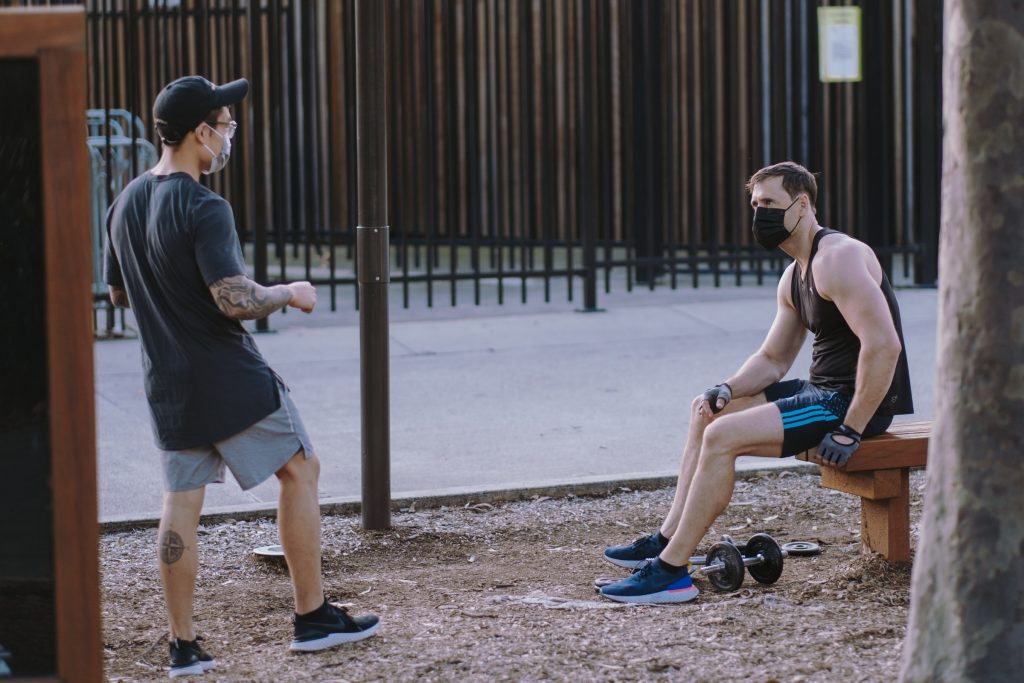This post is also available in Dutch.
For most of us, the COVID-19 pandemic has had a significant impact on our daily lives. With government-ordered prevention measures ranging from full-on lockdown to social (aka physical) distancing, the pandemic has drastically changed our social interactions. Particularly, with many people working from home and reducing the amount of outside excursions, replacing in-person encounters with virtual ones, the number of people we interact with on a regular basis, as well as the frequency and type of those interactions, has changed substantially. Our new lifestyle has some researchers wondering how prolonged social distancing will change how we interact and even how we sound.
Working together but apart
With many enterprises forced online to survive, some people are wondering whether working from home is here to stay. According to experts, some kind of physical distancing measures, be it staggered working hours, separate workspaces, or smaller, remote offices, will likely remain, at least in the short-term. How will social distancing at work affect our social interactions and personal well-being?
A study from the University of Amsterdam examined how people’s attitudes toward working from home have changed since the pandemic. The researchers found that, while overall respondents have become more positive about the prospect of working from home, many also indicated that they’ve come to consider face-to-face contact at work
more important for their enjoyment. Similarly, other studies have found an increase in feelings of loneliness and symptoms of mental health disorders, especially depression and anxiety, to accompany these times. If physical distancing at work is to continue, we will have to find new ways to stay connected and interact for both our own sake and that of our work.

With social distancing measures sending many home from work, feelings of loneliness, anxiety, and depression are on the rise.
Image by Allie via Unsplash.
Isolation can breed new accents
Social isolation might not just change how we interact but also how we sound. Accents, like other cultural behaviors, arise through prolonged contact. Speakers within a certain region or social group may start to sound more similar as they increasingly interact with each other. Isolation from others accelerates this process. One study tried to demonstrate how this process occurs by tracking how a group of people on an expedition to Antarctica started to develop their own new accent.
In this respect, the current pandemic, which has us interacting more with a restricted group of people, could lend itself to accent formation. However, with exposure to different accents through other media, and isolation measures to be eased soon, any sound change that might occur would probably be fairly small.

Isolation, like that of a polar expedition, can lead to the development of a new accent.
Image by Tortsen Dederichs via Unsplash.
Reducing our social network may lead to us becoming less good communicators
Okay, we probably won’t emerge from our homes with a strong quarantine accent, but, according to a recently published study, our communication skills might take a beating. In that study, participants were asked to describe figures to others across multiple rounds. Crucially, while some participants always performed the task with the same partner, others had multiple partners. Later, both groups performed the task with a new partner. Participants who had interacted with multiple partners, rather than one, gave better descriptions. Importantly, this was also the case when participants described the figures for potential future participants. The authors suggest that these refined communication skills may be due to greater practice in taking another’s perspective. In other words, while you may be becoming an expert in deciphering your housemate’s morning grunts, these skills will not be very useful when it’s time to go back to the office.
Social distancing may already have us missing our colleagues and stumbling over our words, and, if prolonged, could even lead to new accents. However, if anything, how quickly these changes set in are an indication of how quickly we can and will adapt when things go back to normal.
Featured image by Kate Trifo via Unsplash.
Credits
Original language: English
Author: Mónica Wagner
Buddy: Francie Manhardt
Editor: Ellen Lommerse
Translator: Felix Klaassen
Editor Translation: Jill Naaijen
Having been raised with two languages herself, Mónica Wagner is interested in how people use and learn multiple languages, especially when it comes to the sounds of languages. During her licence in psychology (National University of Córdoba, Argentina) she looked into whether people who speak two (or more) languages, when wanting to say the word for ‘dog,’ consider the name in both of their languages. Then, during her Master’s in cognitive neuroscience (Radboud University, The Netherlands), she looked at the other side of the coin: whether bilinguals can selectively listen in one of their languages (sometimes even the wrong one!) and the role of the context they’re in at the moment or whether or not the speaker has a foreign accent. Currently Mónica is working on her PhD at the Donders Centre for Cognition (The Netherlands), where she’s studying individual differences in foreign accent, that is, why some people struggle so much to get rid of their foreign accent in a second language, while others seem to be able to acquire a nativelike accent almost effortlessly. She is new to the Donders Wonders team but will likely blog a lot about her favorite topics: languages, bilinguals, and accents!
